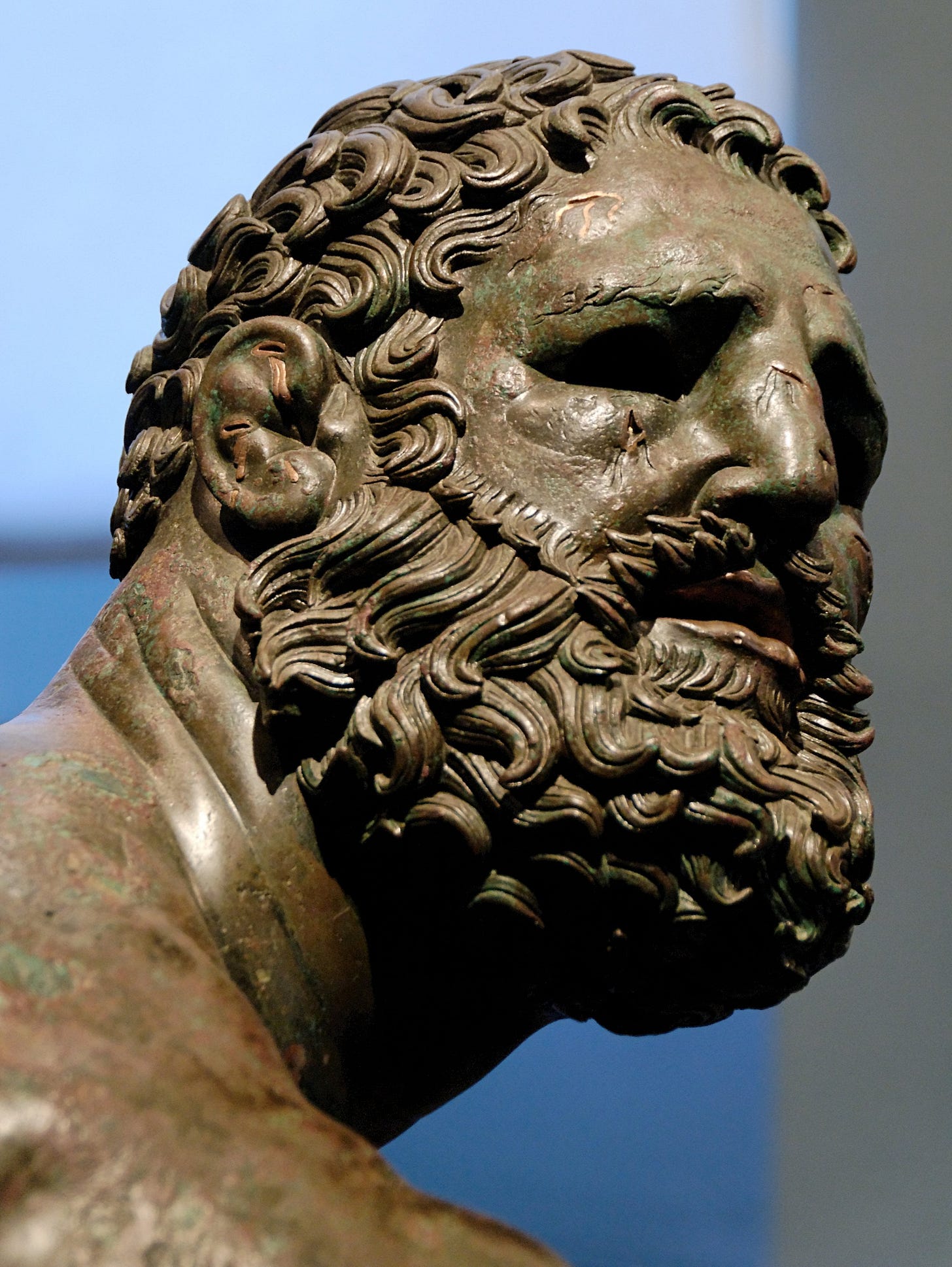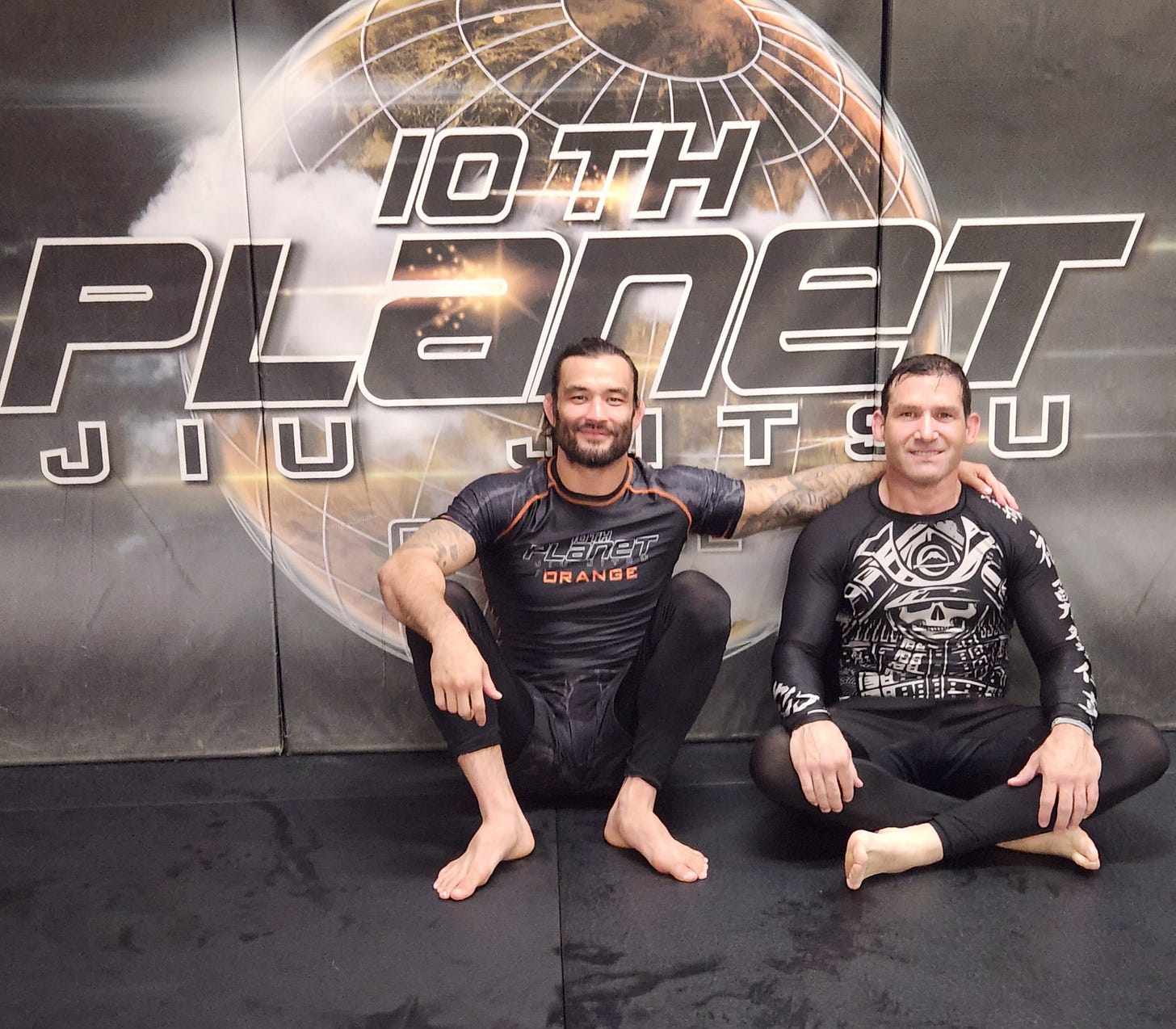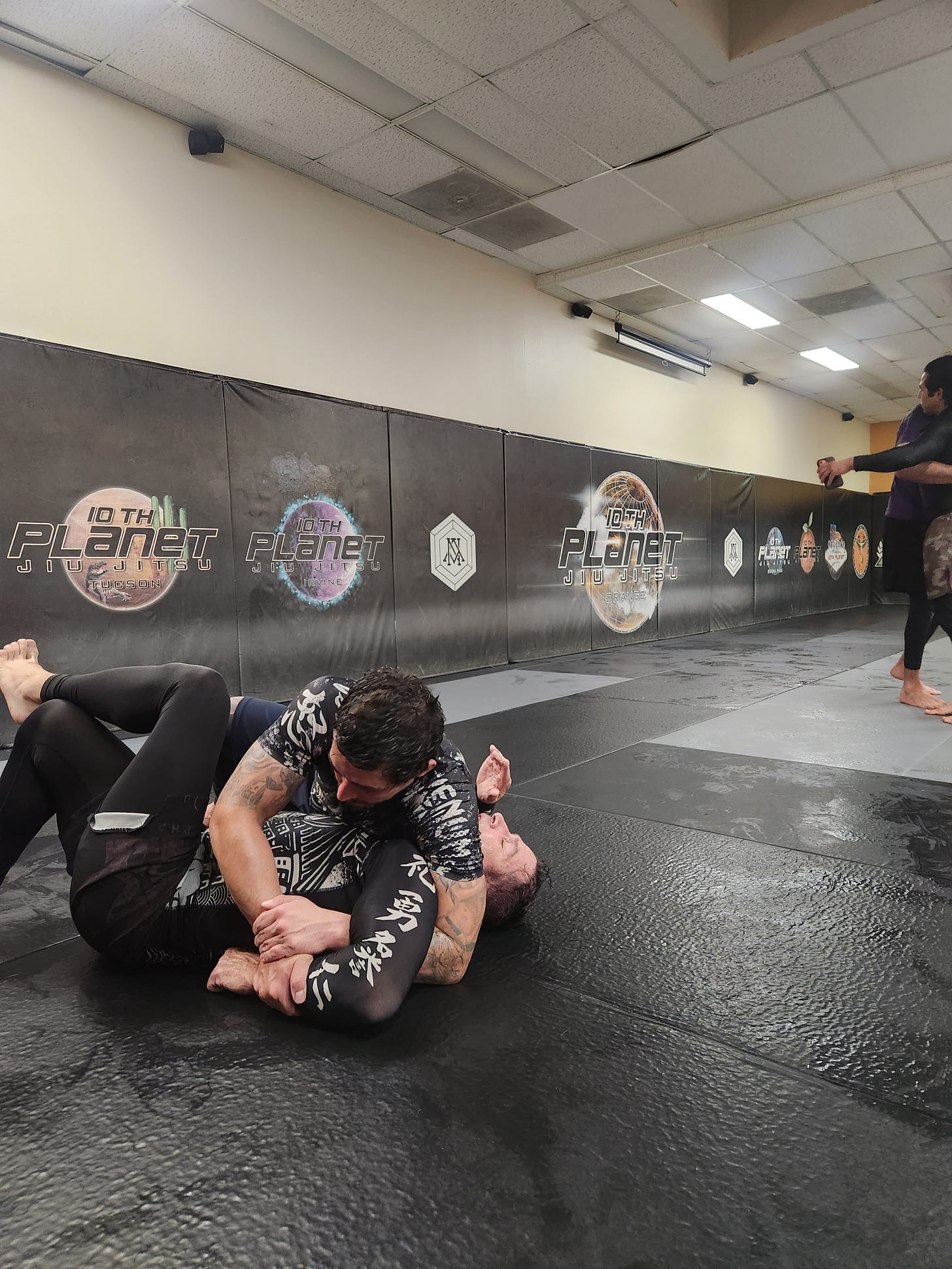Five years ago, on Black Friday, I made the blackest of decisions and signed up to voluntarily get my limbs contorted and my neck attacked.
One good thing about the so-called gentle art known as jiu-jitsu is that you eventually get to dole out punishment after having suffered a requisite amount of it. As with all dichotomies, getting the bad out of the way so that you can enjoy the good is just common sense. First comes the masochism, then the sadism.
“You will die a thousand deaths,” is a trope that rings true every time you add some skills to your utility belt of death and think you're the shit, only to be served up a slice of humble pie as you're belly-down with a guy twice your size and half your age pinning you to a puddle of Grappler's Broth left there from the previous roll when you did the same to a newbie white belt who underwent what you currently are. Suffering is all perspective, right? “I'm strangling you. Don't hate. We're training partners. We are all one. You and your ego. Don’t let your knee ligaments pop. Just TAP.”
Of course I hate to TAP myself. I prefer being the hammer and cry foul by citing claustrophobia when I turn into the nail.
This is plain-old Bully Metaphysics—a gym cosmology where each person knows his or place. When you TAP, you concede defeat. It's the more-macho way of saying Uncle. Yes, it's admitting you've been bested, but it's also you living to fight another day. And that's the beauty of this simulated killing. The killed gets to start over. Who needs an Xbox when you have jiu-jitsu?
Five years in and I still deal with the crushing effects of this Tapping. I know that you're supposed to incinerate your ego. I know that you're supposed to be okay with splaying yourself out on the pizza tray and letting yourself get slid into the oven of truth where the process of burning your sense of overinflation into a crisp is the right course and is precisely what you need.
But make no mistake: I want to be the one doing the femur-snapping, the carotid artery-squeezing, the wrist-hyperextending, the ulna-twisting.
Plato discoursed on the importance of martial prowess in his dialog Laches. Wishing he would have extrapolated a bit more, I too would serve him up a gallon of hemlock. Five years in and I'm just now wondering why the similarity between mysticism and martial arts has not been emphasized to the degree it deserves to be. I know, I know: Bruce Lee was known as a philosopher as well as a martial artist. I can't help but view him as just an actor—and I don't recall him sidekicking triad bosses while pontificating about the pleroma.
Above: The Boxer of the Quirinal. Not Vito Corleone when his ears exploded upon hearing that Fredo was deficient.
If a martial artist has through rigorous training achieved a calmness in otherwise not-calm situations, shouldn't he or she run through grades of gnosis while performing difficult physical feats? What is yoga, after all, if not a method of springboarding the soul to loftier spiritual states through the exertion of the vessel containing it?
10th Planet Jiu-Jitsu black belt Jon Cho, a philosophy major and former special-ed teacher, says this:
“The essence of jiu-jitsu resides in its ability to neutralize aggression through leverage, timing, and technical prowess. This is only achievable by staying calm and rational in a swirling maelstrom of chaos. The more that one trains the art, the easier this becomes, and one can begin to see it benefiting all aspects of life in much the same way. Whatever turmoils life throws at us outside of the mat (work or familial troubles, financial difficulties, etc.), we must face with the same cool rationality we would use to overcome our adversaries in more physical contests.”
Above: Coach Jon Cho and the author at 10th Planet Orange.
When I began training in late 2018, I allowed myself the liberty to suck at it. In many ways, I still do. And when I feel that nothing is working on the mats—the dreaded plateaus—I harken back to Coach Cho and realize that I often as not have life’s circumstances in a stranglehold when before I would have been at their mercy. Deep-diving into esotericism these last few years has definitely helped, yet I'm convinced that jiu-jitsu has led me full circle back to that mystical curiosity I had stumbled upon just after high school.
Like many before me, I always thought that the traditional martial arts embodied the mystical path. Not only did becoming a Kung Fu master unlock chambers of hidden techniques to murk some fools, but it linked you to the Tao. Not only did becoming a Sheehan of Shotokan karate grace you with a knife-hand attack that could part a watermelon or a carjacker’s skull, but it put you on the fast track to becoming a bodhisattva, when now you could knife-hand attack wayward thoughts just as well.
With the advent of mixed martial arts, many of these myths of supernatural capabilities as espoused by these senseis and sifus got dispelled overnight. So yeah: no freezing of waterfalls or levitating of mother-in-laws. Do you know what gets the job done? An overhand right, aka a Haymaker.
What got the job done in the early days of the UFC, mixed martial arts’ premier league, was Brazilian Jiu-jitsu. The undersized guy wrapped himself around the other fighters representing various martial arts and snaked a forearm around the front of their necks, introducing the world to the Rear Naked Choke. To this day, BJJ is one of the four pillars of MMA, the other three being Wrestling, Boxing, and Muay Thai. Every so often, a karate kick shows up for nostalgia's sake. But you'd sooner find Jimmy Hoffa before you would spot some Wing Chun or Aikido in the Octagon.
But if I look beyond my frustration for the lack of a mystical curriculum of jiu-jitsu, I will find a workable system of alchemy. What can be more existential than finding yourself trapped inside a three-dimensional crossword puzzle of violence? No spiritual system can equate to an anatomical chess where checkmate means a broken limb or unconsciousness, or possible death.
There's talk of Nerd Assassins—IT dorks with nasty Anaconda strangles, or coders with sneaky Heelhooks. If boxing is the sweet science, then jiu-jitsu is string theory where the math bears out eleven dimensions. Physicists will come upon a grand Theory of Everything before someone completes a comprehensive jiu-jitsu flow chart.
Why? Because it is counter-intuitive. It demands the body to perform actions never thought necessary. The nuances of musculature, skeletal structure, leverage of tendons and ligaments—all open up a heretofore unexplored vista of possibilities. It's as if a brainiac angel went rogue and escaped heaven with blueprints on how to take another person's life with no external aid. For this I like to call it Endogenous Weaponry.
I answered the siren song of martial arts because of its promise of results. Frustrated for years of not getting my novels published through traditional channels no matter how hard I tried, putting in work in dojos never disappointed. It gave back what you put into it.
Five years in, though, I'm still the ego-driven wannabe mystic who hates to TAP and still gets anti-road-rage rage (that means raging against road-ragers. If you're gonna douche, douche meta).
Yet there is so much beauty of jiu-jitsu, regardless of placement within the Bully Metaphysics. You now have the superpower-like ability to go after an opponent's single limb or body part using your entire body, and also have the wild liberty to choose exactly what incapacitating technique you wish to employ. If you're going to murder someone, sprinkle some rose water on the corpse. I've gotten snooty enough to where I only want to go for French submissions. Guillotine, D'arce. Just keep me away from Foucault and Derrida, and we'll get along just fine.
The one obvious parallel between martial arts and esoteric systems is that of jiu-jitsu with alchemy. So let me restate that jiu-jitsu is the one martial art wherein your very being is shoved into the Athanor—the alchemical oven—where it will be baked time and again into a better version of itself. Throw in a sheet of pot brownies while you're at it. There is surrender when one steps onto the mats and prepares for simulated death. There is change being wrought. And true to all esoteric practices, five years in doesn't guarantee shit.
Above: The Athanor, an alchemist's chief device for transmuting elements into gold.
When I lose, I should celebrate. It means that the techniques work. Falling in love with the gentle art shouldn't only mean falling in love with being good at it, but falling in love with its undeniability. If your training partner bests you, then get whatever he's got. You're in the right place. This is the same as accepting one's fate no matter what spiritual language one adopts. The journey is the destination. Show up and accept the process.
There's another trope bandied about the MMA world: “Either you win or you learn.” The upside to dying a thousand deaths is receiving a thousand rewards. All subsequent ruminations over mistakes made are course corrections on the Path. It's nigh impossible to grow when all you do is come up with successful hour-long meditations on the back of your head, or zero resistance to toplock armbars.
While I find the 10,000-hour rule to mastery rather hyperbolic, I am at least convinced that five years does not get you an interview with the Avengers hiring team. “The more you know,” another cliche runs, “the less you think you know.”
I died death #472 last night. I got ragdolled, rolled up, and ridiculed. But like a phoenix rising from its own ashes, I shall show up tonight for redemption and take flight. Problem is, Little Firebird’s wing ligaments are jacked up from having a nasty Kimura slapped on him by a hulking headwind nicknamed Captain America. I should have Tapped sooner.
Above: A Kimura being applied to the author by Alex. Captain America was busy that night fighting the Red Skull.









"And true to all esoteric practices, five years in doesn't guarantee shit." -- this is something I wish I learned sooner.